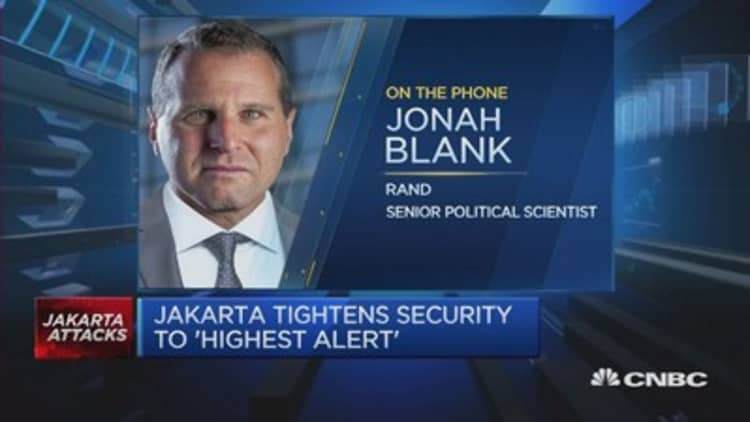
A series of explosions and gunfire that rocked Jakarta on Thursday marks a new style of militancy in Southeast Asia as the Islamic State (ISIS) increasingly mobilizes local terror groups to establish a global Islamic polity, or caliphate.
ISIS [also known as ISIL, IS or Daesh] claimed responsibility for the hours-long violence that left seven dead and over 20 injured in the city's first mass attack since 2009. Experts say the fact that attackers used pistols, rifles and moved around on a large scale revealed a higher degree of sophistication from previous attacks on Indonesian soil, suggesting direction from ISIS.
Local extremist Bahrun Naim, ringleader of a combat unit called Katibah Nusantara, has been identified by Jakarta police as the suspected mastermind. Formed in September 2014, Katibah Nusantara is a Malay-speaking group covering the Malay Archipelago and has been actively connecting extremist networks across Malaysia and Indonesia, helping ISIS further its ideological goals through the use of local terror cells, a process known as 'glocalisation.'
Indeed, Thursday's attack reveals ISIS' transition beyond local causes to global views, explained Greg Barton, director of the Global Terrorism Research Centre at Monash University.
The organization has declared it was behind several international offensives, including Monday's suicide bomb attack at a Baghdad mall and November's shootings in Paris. Turkish Prime Minister Ahmet Davutoğlu has also established an ISIS connection behind Tuesday's suicide bomb in Istanbul.
The organization's international focus could be especially dangerous for Southeast Asia.
Despite boasting a massive Muslim population, the region has escaped becoming a fundamentalist hotbed, unlike Europe, due to its geographical distance from the Middle East. But as ISIS sets its sights on global growth, that could soon change.
"The Islamic State has been slowly trying to take over the network of Jemaah Islamiyah (JI) throughout the entire region," noted Jonah Blank, senior political scientist at RAND, referring to the longstanding Indonesian-based terrorist group that was largely stamped out in 2011 following a police crackdown.
In the past, Southeast Asian extremists have tended to mostly organize among themselves but Thursday's attack could mean units are gaining confidence as they receive specialized input from ISIS. It's unclear how many Indonesians have travelled to Syria and Iraq to fight with ISIS, with estimates ranging from 300 to 700.
"As the Katibah Nusantara expands and gains experience, it could result in the Islamic State placing greater priority on Southeast Asia as a direct war zone, with an eventual province or wilayat declared on [Indonesia's] 17,000 island archipelago," strategists at the Center for Strategic and International Studies (CSIS) in a Thursday note.
Reports have already emerged of ISIS suggesting the Indonesian town of Poso on the island of Sulawesi as its training ground while preparations to proclaim an ISIS branch in the southern Philippine state of Mindanao are reportedly underway.

Should those instances occur, it could see ISIS dispatch explosives experts, combat tacticians and ideologues in the region, luring not only Southeast Asians but other nationalities as well, from Australians to Chinese Uighurs who can't easily reach Syria, noted Rohan Gunaratna, head of the International Centre for Political Violence and Terrorism Research at Nanyang Technological University.
"IS plans' present a very real threat to the stability and security of Southeast Asia, a region that has hitherto enjoyed relative political stability, social harmony and economic growth," Gunaratna added.
Counter-terror strategy
Thursday's attack also shined new light on the effectiveness of Southeast Asia's counter-terrorism strategy.
The ongoing efforts of Indonesian police to deter and stop national threats should prevent the region's largest economy from becoming a terror hub, according to Barton.
"Still, that doesn't mean Indonesia won't face a series of attacks this year. As we saw in France, everybody can be caught by surprise."
Others say President Joko Widodo's administration still has a long way to go.
"I think we have to worry about this [terror] threat growing in the years to come. The Indonesian response has been uneven... They've got to put the same kind of effort in that they did in 2011 to prevent the JI network from transitioning to an ISIS network," warned RAND's Blank.
Taking steps to prevent the radicalization of prisoners by older inmates or clerics and banning trips to Syria or Iraq have been widely touted as preventive measures Widodo could implement.
For neighbors facing similar terror threats, such as the Philippines, improving people's standard of living is key.
"To win Muslim hearts and minds and prevent Muslim support for IS, the Armed Forces of the Philippines should move not in a role of containing, isolating and eliminating groups such as Abu Sayyaf, but with a mandate to economically develop the region," advised Gunaratna.



